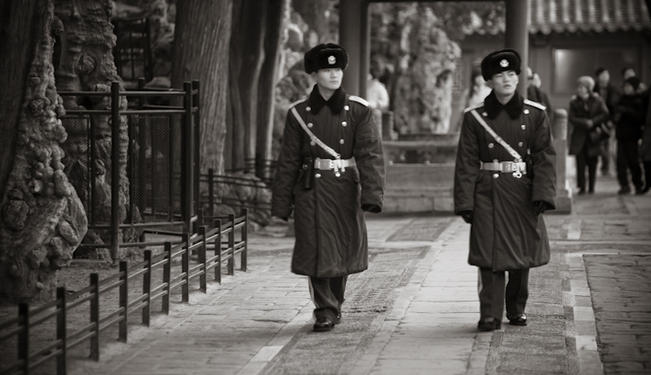India's paranoia over China is a one-sided dilemma.
India and China have trust issues. Modern ties between the two ancient civilizations following the 1947 partition of India and the formation of the People’s Republic of China have been spiked with conflicts and skirmishes - the most serious case being the 1962 Sino-Indian war.
The two countries do have a fruitful economic cooperation. In 2008 China became India’s largest trading partner, and by 2030 the two nations will share the largest trade relationship in the world. This has unfortunately not paved the way for warmer diplomatic ties between the two nations. Border disputes, India’s suspicion towards China’s increasingly cosy relationship with Pakistan, and China’s irritation at Indian friendliness towards the Dalai Lama are the biggest bugbears.
It is to this backdrop that India carried out a test launch of their newest and most formidable missile. The Agni-V, an intercontinental ballistic missile capable of carrying nuclear warheads all the way to Beijing and Shanghai, was launched to great fanfare and success. India’s Defence Research and Development Organisation (DRDO), which oversaw the Agni-V’s development and testing, called the missile a “game-changer” that compares favourably with its equivalents from nuclear-armed countries such as France, Russia, Britain - and China.
Whatever words the DRDO and the Indian government use to address the occasion, there is no doubt that this missile was developed and tested due to fear of China. The V is the first of its Agni namesake that can strike deep into China, thus giving India its first effective nuclear deterrent against China. These are big steps for a nation still deeply embarrassed by the manner of its defeat in the 1962 war, and legitimately concerned about how its defence capabilities compare with the enormous, expanding, and well-funded Chinese armed forces.
But where China has arguably surpassed Pakistan as the number one concern for Indian defence strategists, how does China feel about India? And how concerned are the Chinese about India’s new nuclear missile? Just because one country views the other as its foremost strategic priority, does not mean that the compliment is extended to them. Where the Indian press and some officials like to get into hysterics about the perceived threat from the Middle Kingdom, their Chinese counterparts do not tend to reciprocate this level of volume and attention. The official Chinese response to the Agni-V launch from the Foreign Ministry was to de-emphasise the launch and remind India that the two nations are “not competitors but partners”. There was also little mention of the launch from the Chinese press, other than a brief report carried by CCTV, China’s state-run television network. This report also played down the missile’s threat due to its immobility.
The Chinese indifference to India’s self-defence measures is down to two reasons: One, China has more missiles with a greater strike capability than India. It has emerged from many border conflicts with the upper hand as it controls an overwhelming amount of the high-altitude Tibetan Plateau. China further enjoys warmer relationships with Pakistan and Burma, two important countries in the South Asian region. And two, China is diverting its attention towards the Asia-Pacific in response to the United States’ strategic pivot towards the region.
These aforementioned factors give China a strategic superiority towards India. This is the reason why it is not as fixated on Sino-Indian relations as India is China has instead spent much of its energy preparing for the United States’ renewed focus on the Asia-Pacific. An increased American military presence – the deployment of Marines in Australia, for instance – makes China nervous. As does the eagerness from the other countries of East Asia and South East Asia for an assertive America to guard.
As Chinese dignitaries, diplomats and defence officials meet this American presence, one thing they would certainly prefer is that Sino-Indian relations not sour any further. The two countries may not be exceptionally friendly, but contrary to the Indian press’s wildest proclamations, China has worked hard to identify areas that are common ground for the two countries; for example the West’s demands on China and India with regards to carbon emissions. China has also tried to support India’s bid for a permanent seat on the UN Security Council despite it doing so in tandem with the old enemy Japan.
For now, India remains poorer, less organized and less capable of harming China’s core interests. As a result, India is highly unlikely to usurp the United States as China’s number one strategic priority. China has taken note of the Agni-V’s successful launch but does not feel overly threatened. China will not be moved to deviate from their overall message of cooperation and mutual interests with India.
The views expressed in this article are the author's own and do not necessarily reflect Fair Observer’s editorial policy.
Support Fair Observer
We rely on your support for our independence, diversity and quality.
For more than 10 years, Fair Observer has been free, fair and independent. No billionaire owns us, no advertisers control us. We are a reader-supported nonprofit. Unlike many other publications, we keep our content free for readers regardless of where they live or whether they can afford to pay. We have no paywalls and no ads.
In the post-truth era of fake news, echo chambers and filter bubbles, we publish a plurality of perspectives from around the world. Anyone can publish with us, but everyone goes through a rigorous editorial process. So, you get fact-checked, well-reasoned content instead of noise.
We publish 2,500+ voices from 90+ countries. We also conduct education and training programs
on subjects ranging from digital media and journalism to writing and critical thinking. This
doesn’t come cheap. Servers, editors, trainers and web developers cost
money.
Please consider supporting us on a regular basis as a recurring donor or a
sustaining member.
Will you support FO’s journalism?
We rely on your support for our independence, diversity and quality.







Comment